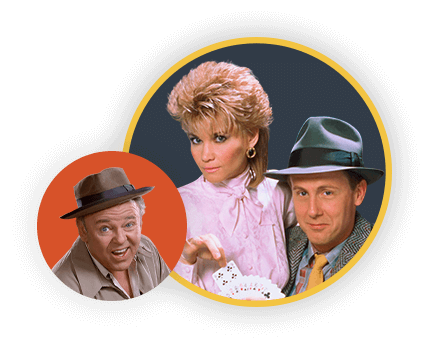12 trailblazing women who forever changed the TV landscape

Top images: Associated Press
In an industry dominated by men, these 12 women fearlessly broke new ground. Some of them were the first of their kind, some put a spotlight on taboo subjects, and some worked tirelessly behind the scenes to create new and exciting programs.
In honor of International Women's Day, we salute these 12 women for being strong, courageous trailblazers who changed the TV landscape for the better. We couldn't imagine what our favorite shows would be like without them.

Lucille Ball
We could write a book on the influence Ball had in the television industry in the 1950s and 1960s. When I Love Lucy premiered in 1951, she stuck up for her husband at a time when animosity towards Cubans and interracial marriage remained high. Also, she helped invent modern syndication by having her series filmed on tape instead of broadcast live.
Along with Arnaz, she ran Desilu Studios for almost two decades. After Ball bought out Arnaz in 1962, she had the final say on projects like Mission: Impossible and Star Trek, effectively launching two beloved series that have generated billions of dollars for its parent company.
Image: Associated Press

Mary Tyler Moore
Women entered the workforce in large numbers in the 1970s, and they all had a role model in Mary Tyler Moore. Her character on The Mary Tyler Moore Show, Mary Richards, proved women didn't have to be housewives to be popular on television. For the first time, women could be smart, sophisticated and career-oriented without facing backlash from viewers.

Bea Arthur
Arthur was one of the most unapologetic feminists on television, with leading roles on two groundbreaking series. The breakout hit Maude tackled the decade's most taboo subjects, some of which are still risky to tackle on TV today. On The Golden Girls in the 1980s, Arthur, along with her costars, proved there is no expiration date for women in Hollywood.
Image: AP Photo/Wally Fong

Nichelle Nichols
Nichols was one of the first black actresses in a prominent role on primetime TV. But instead of portraying a maid or a slave, she played communications officer Lieutenant Uhura on Star Trek, breaking the typecast for black actresses onscreen. The role won the admiration of Dr. Martin Luther King, Jr., and influenced actresses like Whoopi Goldberg.

Carol Burnett
In an era when men like Bob Hope and Milton Berle dominated comedy, Burnett broke through with her wildly popular and critically acclaimed sketch comedy series. The Carol Burnett Show made millions of people laugh every week and raked in numerous Emmy Awards. Additionally, Burnett herself inspired countless comedians — male and female — to break away from gender norms in the world of comedy.
Image: TV Guide

Barbara Walters
What Carol Burnett is to comedy, Barbara Walters is to broadcast journalism. Walters battled sexism in the TV news industry to become the first female co-anchor of The Today Show. After that, she became the first female network anchor on the ABC Evening News, eventually becoming the network's most respected news anchor until her retirement in 2014.
Image: TV Guide

Lynda Carter
Wonder Woman received modest acclaim when it premiered in the 1970s. But since then, Carter's version has become the most iconic symbol for female superheroes on TV and film. Why is that? Think about it: How many female superheroes have had their own series and/or movie since Wonder Woman went off the air in 1979? We still have to wait another year until Wonder Woman gets her own movie.

Diahann Carroll
Just like Nichols, Carroll broke ground for black actresses looking to break free from playing stereotypical roles on TV. Carroll's show, Julia, was the first to feature a black female lead in a role that wasn't a servant. Carroll's character was a widowed nurse raising a son.
Image: Associated Press

Donna Reed
Reed was already an Academy Award winning actress when she received her own TV show in 1958. But what made The Donna Reed Show groundbreaking was that it was the first family sitcom to focus on the mother rather than the father. The concept was unheard of in the 1950s, and it's still somewhat rare on major broadcast networks today.

Peggy Charren
You probably don't know who Charren was, but you're certainly familiar with the shows she helped create. In the late 1960s, when Charren became troubled by the abundance of children's programming created to sell breakfast cereal, she formed the Action for Children's Television. The group successfully lobbied Congress to create educational programming, which spawned shows like Sesame Street and The Electric Company.
Image: YouTube

Rita Moreno
"HEY, YOU GUYS!" Did you know Moreno, who yelled that famous line on The Electric Company, is an Emmy, Grammy, Tony and Academy Award winner? She was one of the most prominent Latina women on television in the 1970s, and opened the door for actresses like American Ferrera and Gina Rodriguez today.
Image: Wikipedia

Irna Phillips
Chances are you've seen one of the programs that Phillips helped create. In addition to being an actress, Phillips created, co-created or wrote classic soap operas like Guiding Light, As The World Turns and Another World. Her early program Woman in White was one of the first pieces of entertainment set in a hospital. In the late 1960s, she worked on the soap Love is Many Splendored Thing, which turned the focus to young modern women.
Image: Wikipedia




